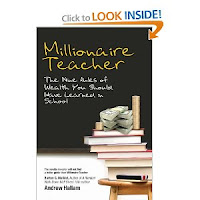 |
| Source: Capital Pixel |
Here's an excellent article for those considering the DIYer route which I highly recommend: "Should I Hire a Financial Advisor or Go it Alone?" by Walter Updegrave.
Thinking about becoming a DIYer is something I promote. IMHO ( as well as Warren Buffet's and many other respected market practitioners) many people are throwing money away by paying professionals to time the market or pick stocks.
Yesterday I had coffee with a lady who explained that her portfolio consisted of three issues: a total stock ETF, an international stock ETF, and a total bond market ETF. Here's the thing: there is voluminous evidence supporting the thesis that a three issue, low expense ratio, low trading cost, broadly diversified portfolio has historically outperformed most professionals over the longer-term (10 years and longer) after all fees are accounted for.
There are some things to know going in, though. First you need to understand that controlling emotions is important. The article points out that those who do not use an advisor actually underperform by 3%/annually on average due partially to emotions - see the study by Financial Engines cited in the article. Secondly, asset allocation is important. Most people get some experience in this by making decisions for their 401(k). The scary part for some is when they get assets outside their 401(k) by rolling over assets when they change jobs or retire. Having more choices and less structure can get some to throw up their hands and pay big management fees to advisors. They assume that investing is complicated and consumes a lot of time. I believe, with a bit of help in the beginning along with some instruction, many can become DIYers as the article suggests.
As an aside - when it comes time to roll over assets, etc., I think just about everyone should at a minimum get some hourly professional advice. It is trickier than most people know. I've written before about trying to wire the dryer in my house and almost burning the house down. You have the same kind of situation here. There are nuances about not taking the rollover as a check to be deposited, rolling assets in kind, the type of account to roll company stock into, etc. that can have a big tax impact.
The article also lists numerous tools to help the DIYer. I find that most major discount brokers offer these tools to analyze funds, allocate assets, track investments (and in the case of Charles Schwab, which I use, track performance relative to a well-defined benchmark) for free. Understanding how to use these tools is the key for the DIYer. One of the services I offer is to set up potential DIYers by doing the initial investing after the assets are rolled over, accounts combined, etc., then explain the investing process, and, when the client feels they are ready, hand it over to them - at which point they are a true DIYer.
In fact, I would encourage those with larger portfolios to consider peeling off a part of their portfolio and give the DIY approach a shot. They will be surprised how little time it takes to manage a portfolio of low-cost index funds. As an added benefit, they will have a means of really assessing their high priced advisor!
Disclosure: the information here is for educational purposes only. No investment returns are implied or guaranteed.









